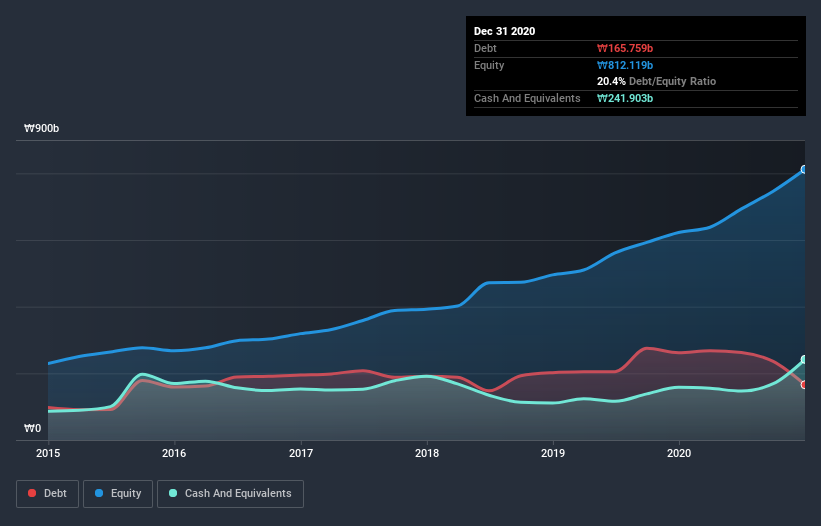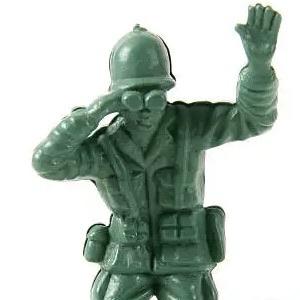David Iben put it well when he said, 'Volatility is not a risk we care about. What we care about is avoiding the permanent loss of capital.' It's only natural to consider a company's balance sheet when you examine how risky it is, since debt is often involved when a business collapses. As with many other companies Kolmar Korea Holdings Co., Ltd. (KRX:024720) makes use of debt. But the real question is whether this debt is making the company risky.
When Is Debt A Problem?
Debt and other liabilities become risky for a business when it cannot easily fulfill those obligations, either with free cash flow or by raising capital at an attractive price. In the worst case scenario, a company can go bankrupt if it cannot pay its creditors. However, a more frequent (but still costly) occurrence is where a company must issue shares at bargain-basement prices, permanently diluting shareholders, just to shore up its balance sheet. Having said that, the most common situation is where a company manages its debt reasonably well - and to its own advantage. When we examine debt levels, we first consider both cash and debt levels, together.
Check out our latest analysis for Kolmar Korea Holdings
What Is Kolmar Korea Holdings's Net Debt?
The image below, which you can click on for greater detail, shows that Kolmar Korea Holdings had debt of ₩165.8b at the end of December 2020, a reduction from ₩262.0b over a year. But it also has ₩241.9b in cash to offset that, meaning it has ₩76.1b net cash.

How Healthy Is Kolmar Korea Holdings' Balance Sheet?
According to the last reported balance sheet, Kolmar Korea Holdings had liabilities of ₩338.0b due within 12 months, and liabilities of ₩68.4b due beyond 12 months. Offsetting these obligations, it had cash of ₩241.9b as well as receivables valued at ₩68.7b due within 12 months. So its liabilities outweigh the sum of its cash and (near-term) receivables by ₩95.8b.
Of course, Kolmar Korea Holdings has a market capitalization of ₩537.7b, so these liabilities are probably manageable. But there are sufficient liabilities that we would certainly recommend shareholders continue to monitor the balance sheet, going forward. While it does have liabilities worth noting, Kolmar Korea Holdings also has more cash than debt, so we're pretty confident it can manage its debt safely.
On top of that, Kolmar Korea Holdings grew its EBIT by 41% over the last twelve months, and that growth will make it easier to handle its debt. When analysing debt levels, the balance sheet is the obvious place to start. But you can't view debt in total isolation; since Kolmar Korea Holdings will need earnings to service that debt. So if you're keen to discover more about its earnings, it might be worth checking out this graph of its long term earnings trend.
Finally, a business needs free cash flow to pay off debt; accounting profits just don't cut it. While Kolmar Korea Holdings has net cash on its balance sheet, it's still worth taking a look at its ability to convert earnings before interest and tax (EBIT) to free cash flow, to help us understand how quickly it is building (or eroding) that cash balance. In the last three years, Kolmar Korea Holdings created free cash flow amounting to 9.5% of its EBIT, an uninspiring performance. For us, cash conversion that low sparks a little paranoia about is ability to extinguish debt.
Summing up
Although Kolmar Korea Holdings's balance sheet isn't particularly strong, due to the total liabilities, it is clearly positive to see that it has net cash of ₩76.1b. And it impressed us with its EBIT growth of 41% over the last year. So we are not troubled with Kolmar Korea Holdings's debt use. There's no doubt that we learn most about debt from the balance sheet. However, not all investment risk resides within the balance sheet - far from it. These risks can be hard to spot. Every company has them, and we've spotted 1 warning sign for Kolmar Korea Holdings you should know about.
When all is said and done, sometimes its easier to focus on companies that don't even need debt. Readers can access a list of growth stocks with zero net debt 100% free, right now.
If you’re looking to trade Kolmar Korea Holdings, open an account with the lowest-cost* platform trusted by professionals, Interactive Brokers. Their clients from over 200 countries and territories trade stocks, options, futures, forex, bonds and funds worldwide from a single integrated account. Promoted
Valuation is complex, but we're here to simplify it.
Discover if Kolmar HoldingsLtd might be undervalued or overvalued with our detailed analysis, featuring fair value estimates, potential risks, dividends, insider trades, and its financial condition.
Access Free AnalysisThis article by Simply Wall St is general in nature. It does not constitute a recommendation to buy or sell any stock, and does not take account of your objectives, or your financial situation. We aim to bring you long-term focused analysis driven by fundamental data. Note that our analysis may not factor in the latest price-sensitive company announcements or qualitative material. Simply Wall St has no position in any stocks mentioned.
*Interactive Brokers Rated Lowest Cost Broker by StockBrokers.com Annual Online Review 2020
Have feedback on this article? Concerned about the content? Get in touch with us directly. Alternatively, email editorial-team (at) simplywallst.com.
About KOSE:A024720
Kolmar HoldingsLtd
Manufactures and sells cosmetics, pharmaceuticals, and health functional foods in South Korea and internationally.
Low risk and slightly overvalued.
Market Insights
Community Narratives


Recently Updated Narratives


The Quiet Giant That Became AI’s Power Grid


Nova Ljubljanska Banka d.d will expect a 11.2% revenue boost driving future growth



